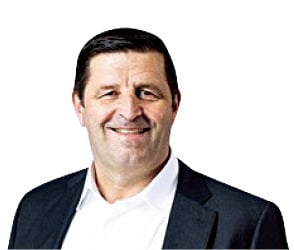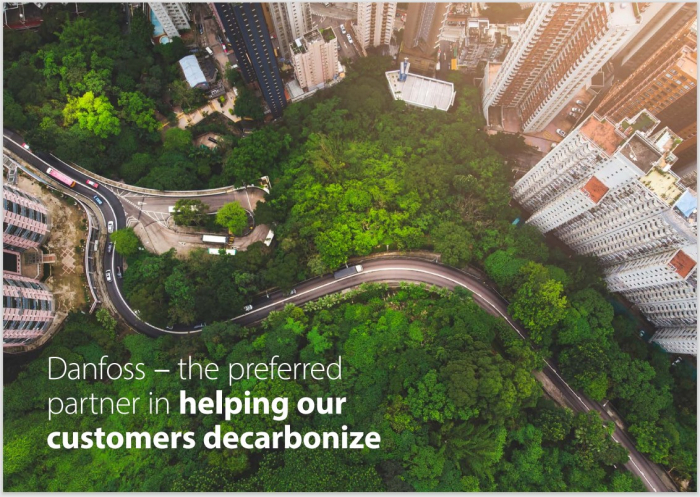Energy
Danfoss installs energy-saving heating systems in Korea's tallest building
Denmark's zero-carbon efforts go beyond buildings and vessels to construction sites
By Jun 14, 2022 (Gmt+09:00)
3
Min read
Most Read
LG Chem to sell water filter business to Glenwood PE for $692 million


Kyobo Life poised to buy Japan’s SBI Group-owned savings bank


KT&G eyes overseas M&A after rejecting activist fund's offer


StockX in merger talks with Naver’s online reseller Kream


Mirae Asset to be named Korea Post’s core real estate fund operator



SONDERBORG, Denmark – Denmark’s eco-friendly energy system provider Danfoss has made inroads into South Korea, installing its energy-efficient heating, ventilation and air controlling systems (HVAC) in the world’s fifth-tallest building, The Lotte World Tower in Seoul.
The HVAC solutions help the 123-floor skyscraper reduce energy consumption by about 5,000 megawatts per year, said Jürgen Fischer, president of Danfoss’ Climate Solutions business.
Established in 1933, Danfoss in the coastal town of Sønderborg provides solutions to increase energy efficiency in buildings and district heating systems, which in turn reduce carbon emissions and energy consumption.
Fischer noted that its energy-efficient solutions will be useful, particularly for high-rise buildings that dot the Seoul skyline.
The Danish company uses waste heat and hot water, instead of fossil fuels, to operate heating systems, heat pumps and inverters. An inverter controls the rotation speed of a motor.
To further reduce energy waste, its balancing valves control the flow of water for each section of the building.

ENERGY-SAVING PLANS IN PRE-CONSTRUCTION STAGE
Buildings account for 40% of global energy consumption and thus, energy-efficient heat pumps can help buildings escape the stigma of being energy guzzlers, Fischer told The Korea Economic Daily from the company's headquarters in Sønderborg.
For example, a multifamily home in the Danish town can cut the energy consumption by 81 megawatts hour per year after the installation of Danfoss’ heat pumps.
He expects the heat pump market to grow by five to sixfold over the next five years.
For factories, Fischer advised companies to design heating, cooling and ventilation systems in the pre-construction stage, which would reduce energy consumption than the buildings that introduce energy-efficient systems after the facilities are completed.
DECARBONIZATION GOALS
Danfoss aims to go zero carbon by 2029, ahead of 2050 by when companies are advised to achieve carbon neutrality as per the Paris Agreement.
To meet the goal, the family-controlled company is aiming to become emission-free at all its head office facilities -- from production sites to test apparatus and administration offices.
It is the first energy company in the world that participated in three major global campaigns for reducing carbon emissions: EP100, EV100 and RE100. Of these, RE100 is a multinational initiative to make a full switch to renewable energy by 2050.
As part of its efforts to reduce energy consumption, its ventilation systems, twice as tall as the average height of an adult, play a key role in lowering the inner temperature of its factory’s heating systems from 145 degrees to 67 degrees.
Danfoss operates 100 factories in 21 countries with annual sales of about $10 billion, for which it has been shifting toward renewable energy such as wind and solar power.
ZERO-CARBON FOR CONSTRUCTION
In addition to buildings, Denmark is working on reducing carbon emissions on construction sites by using fully electric excavators. All-electric excavators lower energy consumption by 75% while reducing noise, according to a construction manager in Sønderborg.
In line with global eco-friendly practices, South Korea’s construction equipment makers are ramping up efforts to increase their market share in Europe with energy-efficient machines.
This year, Europe’s construction equipment market is forecast to grow 4% from last year.
For South Korea-based Hyundai Doosan Infracore Co., Europe accounted for 12% of its sales of construction machines in the first quarter of this year, nearly double the 6.4% of the year previous.
Write to Jeong-Min Nam at peux@hankyung.com
Yeonhee Kim edited this article.
More to Read
-

-
 MarketsZero-carbon, self-driving still in distant future for top Kospi stocks
MarketsZero-carbon, self-driving still in distant future for top Kospi stocksOct 22, 2021 (Gmt+09:00)
4 Min read -
 ESGSK Chairman vows to achieve carbon neutrality ahead of 2050 UN target
ESGSK Chairman vows to achieve carbon neutrality ahead of 2050 UN targetJun 23, 2021 (Gmt+09:00)
3 Min read
Comment 0
LOG IN


